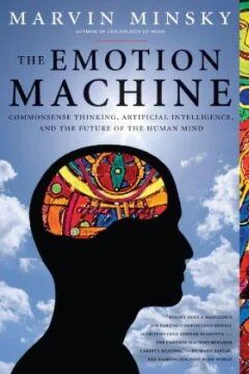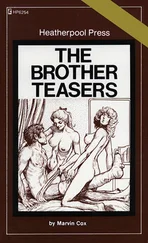We have many different ways to learn, and also can learn new ways to learn.
We can often postpone a dangerous action and imagine, instead, what its outcome might be in some Virtual World.
Our language and culture accumulates vast stores of ideas that were discovered by our ancestors. We represent these in multiple realms, with metaphors interconnecting them.
Most every process in the brain is linked to some other processes. So, while any particular process may have some deficiencies, there frequently will be other parts that can intervene to compensate.
Nevertheless, our brains still have bugs. Similarly, in the coming decades of research toward Artificial Intelligence, every system that we build will keep showing unexpected flaws. In some cases, we’ll be able to diagnose specific errors in those designs, and hence be able to correct them. But when we can find no such simple fix, then we will be forced instead to evolve increasingly complex systems in which each process needs to be supervised by various Critics. [edit] And through all this, we can never expect to find any foolproof strategy to balance the advantage of immediate action against the benefit of more careful, reflective thought. Whatever we do, we can be sure that the road toward designing ‘post-human minds’ will be rough.
Acerra 1999: Francesca Acerra, Yves Burnod and Scania de Schonen, European Symposium on Artificial Neural Networks, Bruges (Belgium), 1999, ISBN 26000499X, pp. 129-134. Text at http://www.dice.ucl.ac.be/Proceedings/esann/esannpdf/es1999-22.pdf
Aristotle a: Nicomachean Ethics , Book VIII. Text at http://etext.library.adelaide.edu.au/a/aristotle/nicomachean/
Aristotle b: Rhetoric . Text at http://etext.library.adelaide.edu.au/a/a8rh/
Arnold 1865: Matthew Arnold, Essays in Criticism . Ed. S. R. Littlewood. London: Macmillan. 1958.
Augustine 397: The Confessions, Book 10. Text at http://www.ourladyswarriors.org/saints/augcon10.htm#chap10.
Baars 1996: Bernard J. Baars, “Understanding Subjectivity: Global Workspace Theory and the Resurrection of the Observing Self,” Journal of Consciousness Studies , 3, No. 3, 1996, pp. 211-16. Also at http://www.imprint.co.uk/online/baars.html
Bacon 1620: Francis Bacon, Novum Organum, at http://etext.library.adelaide.edu.au/b/bacon/francis/organon/
Battro 2000: Antonio M. Battro, Half a Brain is Enough, Cambridge University Press, Nov. 2000, ISBN 0521783070. Also see http://www.nobel.se/medicine/laureates/1981/sperry-lecture.html .
Blakemore 1999: Susan Blackmore, The Meme Machine, Oxford (1999), ISBN 019286212X.
Bowlby 1973. John Bowlby [1907-1990] , Attachment, Basic Books, N.Y. 1973, ISBN 0465005438.
Bowlby 1973b: John Bowlby, Separation p26 and p59. Basic Books, N.Y. 1973 ISBN 0465-076912
Calvin 1966: William H. Calvin, How Brains Think, Basic Books, 1966.
Calvin 1994: William H. Calvinand George A. Ojemann, Conversations with Neil’s Brain, The Neural Nature Of Thought And Language, Basic Books , ISBN 0201483378. Also at http://williamcalvin.com/bk7/bk7.htm .
Carlson 1985: Shawn Carlson, "A Double-Blind Test of Astrology,'' Nature , vol. 318, p.419 (5 Dec 1985)
Carroll 2003: Adapted from the entry on Cold Reading by Bertram Forer, in Robert Todd Carroll, The Skeptic's Dictionary: A Collection of Strange Beliefs, Amusing Deceptions, and Dangerous Delusions, Wiley 2003 ISBN: 0471272426. Text at http://skepdic.com/coldread.html
Chalmers 1995: David J. Chalmers, “Facing Up to the Problem of Consciousness,” Journal of Consciousness Studies 2(3), 200-19, 1995. At http://www.u.arizona.edu/~chalmers/papers/facing.html.
Chalmers 1995b: David J. Chalmers, “The Puzzle of Conscious Experience” Scientific American, December 1995 pp. 62-68.
Chandler 2004: Keith Chandler, Australian Journal of Parapsychology, June 2004, Vol. 4, No. 1. Also at http://www.keithchandler.com/Essays/Savant_Syndrome.html
Charniak 1972: Eugene Charniak, “Toward a Model Of Children's Story Comprehension,” PhD thesis 1972, MIT, MIT Artificial Intelligence Laboratory Technical Report TR-266. Also at ftp://publications.ai.mit.edu/ai-publications/pdf/AITR-266.pdf
Clynes 1978: Manfred Clynes, Sentics , New York: Doubleday, 1978
Damasio 1995: Antonio R. Damasio, Descartes' Error , Avon Books, Nov 1995, ISBN: 0380726475
Darwin 1871: Charles Darwin, The Descent of Man, 1871, Simon&Schuster, 1986. Text at http://www.infidels.org/library/historical/charles_darwin/descent_of_man
Darwin 1872: Charles Darwin, Expression of The Emotions In Man And Animals, 1872, Paul Ekman (ed), Oxford, 1998, ISBN 0195112717
Davies 1992: Robertson Davies, Tempest-Tost, Penguin , 1992, ISBN: 0140167927 .
Dawkins 1986: Dawkins, Richard, " The Blind Watchmaker: Why the Evidence of Evolution Reveals a Universe Without Design (W.W. Norton and Company, New York, 1986
Dawkins 1989: Richard Dawkins, The Selfish Gene, Oxford University Press, 1989, ISBN 0192860925.
[Ref. To Memes?]
Dennett 1978: Daniel C. Dennett, “Why you can’t build a machine that feels pain,” Brainstorms , MIT Press, Bradford Books, 1978, 190-229, ISBN 0262540371.
Dennett 1984: Daniel C. Dennett, Elbow Room: The Varieties of Free Will Worth Wanting, Bradford Books, ISBN 0262540428.
Dennett 1988: Daniel Dennett, “Quining Qualia,” in A. Marcel and E. Bisiach (eds.), Consciousness in Modern Science , Oxford University Press 1988. Reprinted in A. Goldman, ed. Readings in Philosophy and Cognitive Science , MIT Press, 1993. Text at http://cogprints.org/254/00/quinqual.htm .
Dennett 1991: Daniel C. Dennett, Consciousness Explained , Little Brown, 1991, ISBN 0-713-99037-6
Dennett 1992: Daniel C. Dennett, and Marcel Kinsbourne, “Time and the Observer,” Behavioral and Brain Sciences 15(2): pp183-247, 1992. Also at http://cogprints.ecs.soton.ac.uk/archive/00000264/
Dennett 1992b, Daniel C. Dennett “The Self as a Center of Narrative Gravity,” in F. Kessel, P. Cole and D. Johnson (eds.) Self and Consciousness: Multiple Perspectives. Hillsdale, NJ: Erlbaum. Also at http://cogprints.org/266/00/selfctr.htm.
Dennett 1995: Daniel C. Dennett, Darwin’s Dangerous Idea , Simon & Schuster, 1995, ISBN 068482471
Descartes 1637 : Rene Descartes, in Discours de la méthode. “Et le second est que, bien qu'elles fissent plusieurs choses aussi bien, ou peut-être mieux qu'aucun de nous, elles manqueraient infailliblement en quelques autres, par lesquelles on découvrirait qu'elles n'agiraient pas par connaissance, mais seulement par la disposition de leurs organes. Car, au lieu que la raison est un instrument universel, qui peut servir en toutes sortes de rencontres, ces organes ont besoin de quelque particulière disposition pour chaque action particulière; d'où vient qu'il est moralement impossible qu'il y en ait assez de divers en une machine pour la faire agir en toutes les occurrences de la vie, de même façon que notre raison nous fait agir.”
Drescher 1991: Gary Drescher, Made-Up Mind s, MIT Press 1991, ISBN: 0262041200
Egan 1998: Greg Egan Diaspora, Millennium Press, 1998, ISBN 0752809253
Einstein 1950: Albert Einstein, Out of My Later Years , Philosophical Library, New York, 1950, pp. 15 - 20.
Evans 1963: Thomas G. Evans, A Heuristic Program to Solve Geometric-Analogy Problems , MIT PhD Thesis, 1963, abridged version in Minsky 1968, pp. 271-353.
Читать дальше












